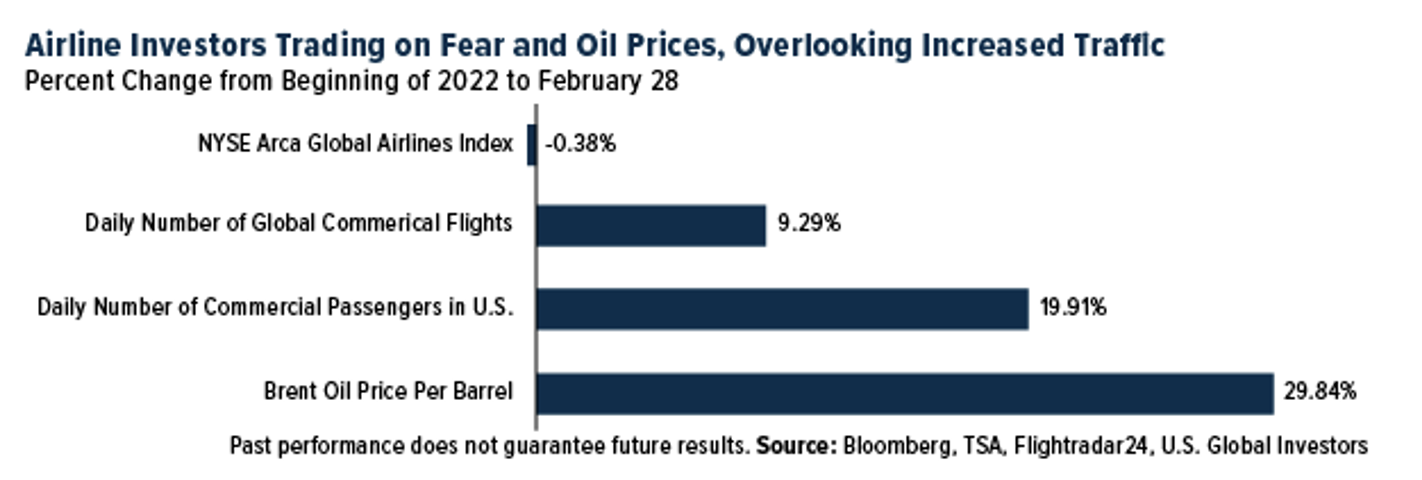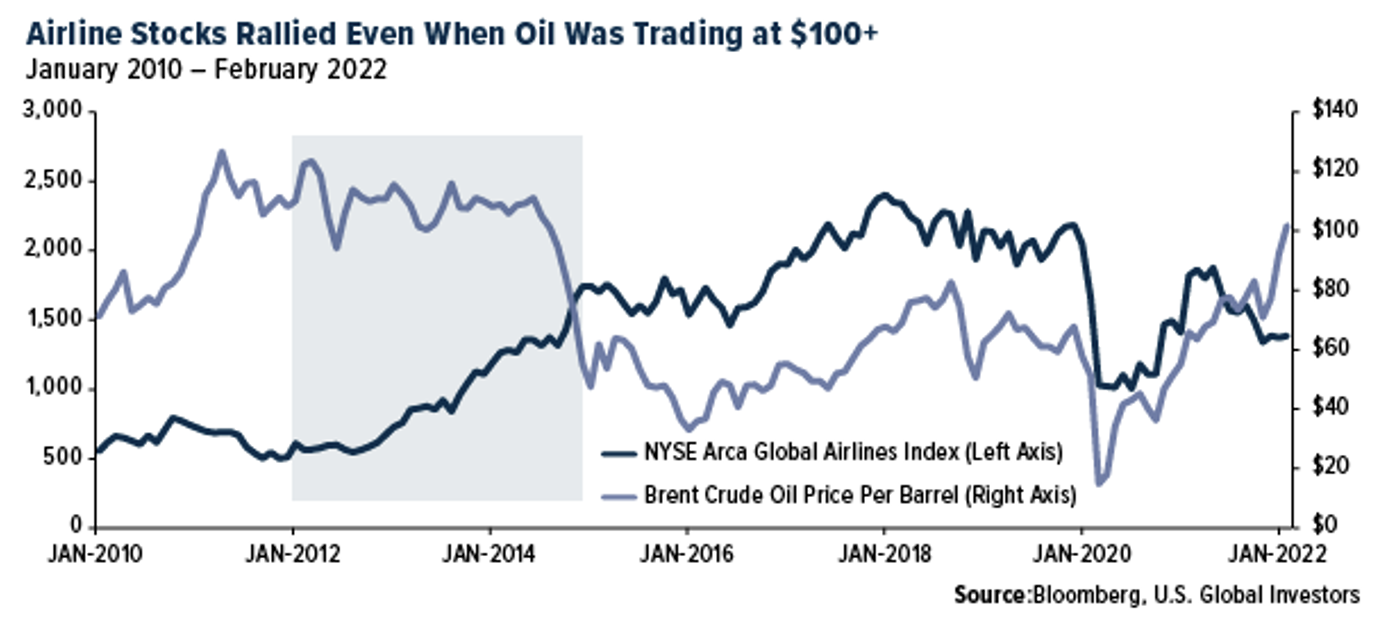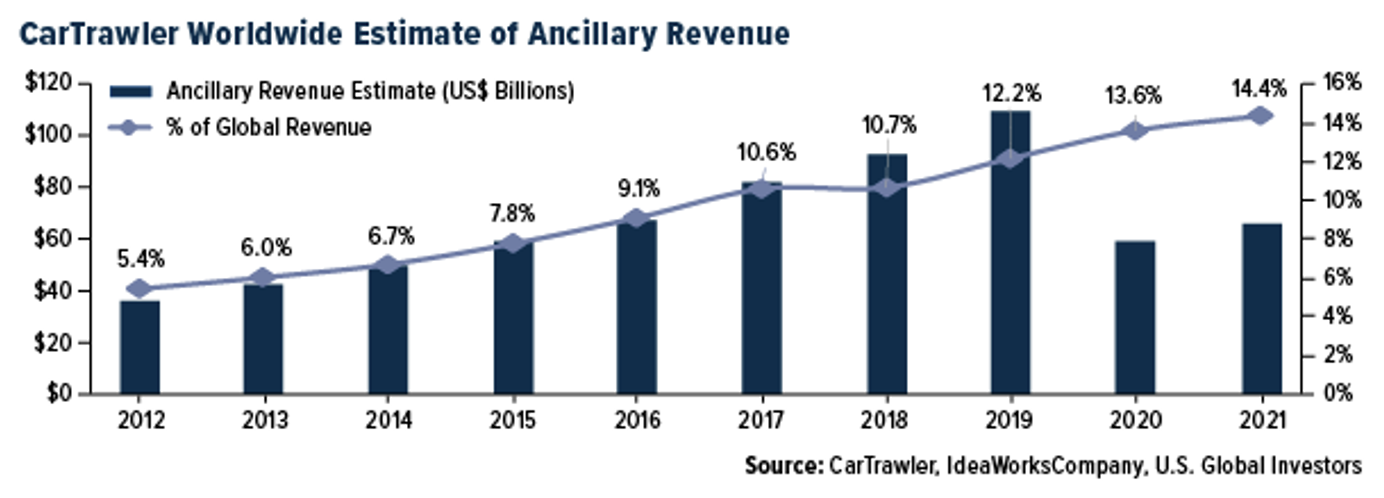Airline Stocks Surged To All-Time Highs When Oil Was Trading Above $100
Frank Holmes | Mar 02, 2022 05:18PM ET
Brent crude oil came close to $114 per barrel on Wednesday, its highest level since June 2014, as the conflict in Ukraine intensified and sweeping economic sanctions were imposed on Russia, the world’s third largest oil producer.
As a result of geopolitical uncertainty, stocks have largely sold off, with the MSCI World Index dropping more than 2.6% in the month of February.
Global airline stocks, though, finished the month slightly ahead, with a gain of about 0.6%, a possible sign that investors were sensing a return to normalcy from the pandemic before the Kremlin began rattling its sabre.
But now airlines face a new challenge with higher fuel costs—or so the market seems to believe. Even though demand for commercial air travel increased nicely in the first two months of 2022, with the number of global flights growing 9.3% and number of U.S.-based passengers growing 20%, an index of global airline stocks dipped a moderate 0.4%.
This has created what I think could be an attractive buying opportunity.

Operating Efficiently In A High Fuel Cost Environment
The price of crude has advanced a lot so far this year, and fuel is one of the biggest expenses airlines have. That alone may seem like a major headwind. But higher fuel costs have not necessarily stopped shares from rising.
Take a look below. Oil prices were highly elevated from 2011 to mid-2014 and, yet, global airline stocks surged to new all-time highs.

They continued to soar over the next few years, not just because the oil market collapsed, but because carriers had become leaner and more efficient. They learned to pack more people on every flight. They practiced capacity discipline by getting rid of unprofitable routes. And they started charging extra for perks and services that used to be included in the price of a ticket.
In 2012, these ancillary fees generated under $40 billion for global carriers, and by 2019, they were responsible for bringing in close to $110 billion, according to IdeaWorks. Even though the fees fell in dollar terms due to the pandemic, they continue to represent a larger share of global airline revenue, which should help companies offset the rising cost of fuel.

Capacity Discipline Is Also Key
In addition, some analysts have shown that airline stock performance is driven not by oil prices or even earnings, but by the perception of pricing power. Back in 2016, Wolfe Research’s Hunter Keay told CNBC that, in certain environments, high fuel costs could actually be good for carriers because they encourage capacity discipline, which, in turn, makes the group more attractive to investors.
Explained Keay:
“Capacity discipline and fundamental behaviors are far more important than the amount of money [carriers] earn. It’s got nothing to do with estimates; it’s got nothing to do with margins; it’s got nothing to do with how much money or cash flow you’re making, even. It’s how you make it. Is it sustainable? High oil prices create that dynamic.”
Granted, airlines are facing challenges at the moment that didn’t exist when Keay made these comments, including the ongoing pandemic and Russia’s aggression against its neighbor. And yet, his fundamental point remains intact.
All opinions expressed and data provided are subject to change without notice. Some of these opinions may not be appropriate to every investor. By clicking the link(s) above, you will be directed to a third-party website(s). U.S. Global Investors does not endorse all information supplied by this/these website(s) and is not responsible for its/their content.
The MSCI World Index is a broad global equity index that represents large and mid-cap equity performance across 23 developed markets countries. It covers approximately 85% of the free float-adjusted market capitalization in each country. The NYSE Arca Global Airline Index is a modified equal dollar weighted index designed to measure the performance of highly capitalized and liquid international airline companies.
Trading in financial instruments and/or cryptocurrencies involves high risks including the risk of losing some, or all, of your investment amount, and may not be suitable for all investors. Prices of cryptocurrencies are extremely volatile and may be affected by external factors such as financial, regulatory or political events. Trading on margin increases the financial risks.
Before deciding to trade in financial instrument or cryptocurrencies you should be fully informed of the risks and costs associated with trading the financial markets, carefully consider your investment objectives, level of experience, and risk appetite, and seek professional advice where needed.
Fusion Media would like to remind you that the data contained in this website is not necessarily real-time nor accurate. The data and prices on the website are not necessarily provided by any market or exchange, but may be provided by market makers, and so prices may not be accurate and may differ from the actual price at any given market, meaning prices are indicative and not appropriate for trading purposes. Fusion Media and any provider of the data contained in this website will not accept liability for any loss or damage as a result of your trading, or your reliance on the information contained within this website.
It is prohibited to use, store, reproduce, display, modify, transmit or distribute the data contained in this website without the explicit prior written permission of Fusion Media and/or the data provider. All intellectual property rights are reserved by the providers and/or the exchange providing the data contained in this website.
Fusion Media may be compensated by the advertisers that appear on the website, based on your interaction with the advertisements or advertisers.